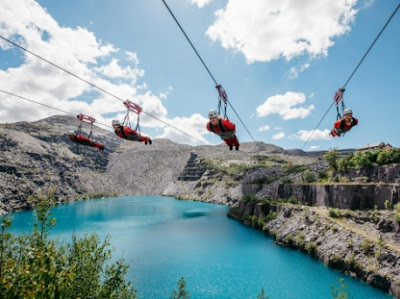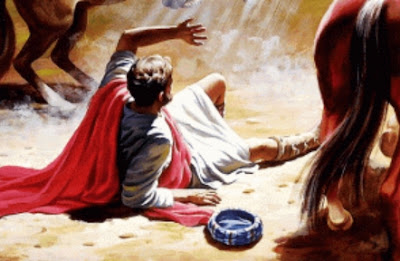You'll Not Get fbb Up In One Of Those!
Should our loyal reader wish to experience this terrifying, heart stopping delight (?) here is how.Travel south from Bangor on Thomas Telford's A5 and you quickly come to Bethsda. Just past the throbbing heart of the village is a right hand turn on to the B4409.The sign has the addition of a white-on-brown "touist" sign to ...... a left hander off the B4409 ...... leading to a company selling Welsh slate and the wonderful "Zip World". It all happens in and around the once massive Penryn Quarry.The business and the quarries were both huge. In this Google Earth aerial view, the "Zip-wire" lake looks like a small pond.It is really hard to gauge the scale of this view.... but the substantial building bottom right below give something of a clue.It was, to use a technical quarryman's term, BIG!
Also, for the technically minded, we need to understand that slate is very heavy and it is not much use stuck in a pile in a quarry. You have to get it out to customers.
The Penrhyn Quarry bosses, like many others in North Wales, saw the easiest route would be by sea. And Bangor (now in Gwynedd) was the nearest place where easily accessible sea (Menai Straits) could be seen, see!So, build a port and, modestly for the bosses, call it Porth Penrhyn.The site is still recognisable (just!) with the large light-coloured building (port manager's posh house) now shrouded in trees.Porth Penrhyn is a harbour located just east of Bangor in north Wales at the confluence of the River Cegin with the Menai Strait. It was formerly of great importance as the main port for the export of slate from the Penrhyn Quarry, the largest slate quarry in the world at the end of the nineteenth century. It was built, and later expanded, by the Pennant (later Douglas-Pennant) family of the nearby Penrhyn Castle.The estate was developed, as was the slate business, using funding from the cotton farms and concomitant slave trade, so maybe in today's more enlightened times, no one should ever visit Zip World!
But there was the practicality of getting slate from quarry to port. Originally horse and cart was the method but it was slow and expensive.
So why not build a railway?And so they did. It ran reasonably directly between the two locations but required no less than THREE rope worked inclines. The rest of the route was horse-drawn and it lasted from 1801 to 1878.
Sadly, there is no photographic evidence of this line and almost all evidence of its route on the ground has been overgrown to the point of obliteration. But we may get the measure of it as we explore later developments.
In 1878 the line was re-routed and converted to steam operation then, to further complicate matters, the big railway built a passenger railway branch from Bangor to Bethesda opening in 1884. These various bits of infrastructure intertwined in a mysterious manner, easily confusing the old man.
It looks like fun!================================
Advent Calendar Day 19
Troubles and Travels
The Bible book, entitled Acts of the Apostles, has a strange title. It really only focuses on a small number of people, most of whom were not Apostles (i.e. Jesus's gang of Twelve). The only Apostle in a lead role was Peter. The main star is Paul with Stephen getting an important and tragic supporting role.
Acts was written by Gospel writer Luke and could well be headed "What God Did Next".
But they were right to be fearful. After the Gift of the Holy Spirit, we read about the beginnings of persecution with key characters being arrested in a desperate attempt to put a stop to the growing realisation that, however impossible it might seem, the Jesus that was killed by the authorities had risen from the dead and was powering this vibrant new take on God.
That new take led to a healing of a lame man.And after arrest and interrogation the bigwigs came to a conclusion.
So they called them back in and told them that under no condition were they to speak or to teach in the name of Jesus. But Peter and John answered them, “You yourselves judge which is right in God's sight - to obey you or to obey God. For we cannot stop speaking of what we ourselves have seen and heard.” So the Council warned them even more strongly and then set them free. They saw that it was impossible to punish them, because the people were all praising God for what had happened.
And for the authorities it got worse.
So Stephen was stoned to death. But that event only strengthened the resolve of the spirit-filled believers.
As the members of the Council listened to Stephen, they became furious and ground their teeth at him in anger. With a loud cry the Council members covered their ears with their hands. Then they all rushed at him at once, threw him out of the city, and stoned him. They kept on stoning Stephen as he called out to the Lord, “Lord Jesus, receive my spirit!” He knelt down and cried out in a loud voice, “Lord! Do not remember this sin against them!” He said this and died.
As if that wasn't enough their Christian-finder General changed sides!
As Saul was coming near the city of Damascus, suddenly a light from the sky flashed around him. He fell to the ground and heard a voice saying to him, “Saul, Saul! Why do you persecute me?”
“Who are you, Lord?” he asked.
“I am Jesus, whom you persecute,” the voice said. “But get up and go into the city, where you will be told what you must do.”
And we know what the arch-persecuter was told to do. In essence he was to travel the known Roman world and preach the truth about the risen Jesus.
And he did. Some change, eh?
CHRISTmas changed Paul's life beyond recognition; and that is what CHRISTmas is designed to do!
===================================
Next Wednesday Wee blog : 21st December



















We visited Penrhyn Castle in the summer - it is a gloomy place! Much was made of the former slave connection, indeed almost to the extent of overshadowing the way that the family also made money from the slate workers, often working in cold and dangerous conditions. There is an interesting display of locomotives and rolling stock, including the amazing "Fire Queen", but it felt very "dead" and slightly neglected. The National Slate Museum in Llanberis is far more evocative and informative - and it's free!
ReplyDelete